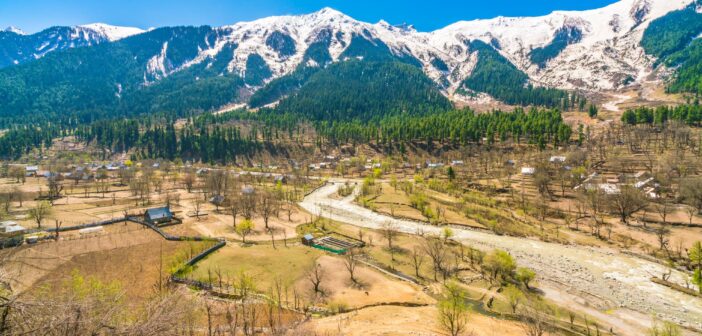Questions like who all would be able to buy a house in Jammu & Kashmir is on everybody’s lips. While the builders are evaluating the cost & benefit of real estate opportunity over there, the home buyers are wondering about the affordability of having a house in the scenic region.
The changes in the land laws in Jammu & Kashmir has mostly been debated from the political standpoint. However, it has a direct linkage with the way the property market would shape up in a tourist destination that has thus far been seen as a hostile destination. The moot point today is whether the changed land laws would lead to any tangible difference in the property market over there. Will the developers actually flock to land scouting in this part of the world?
To understand the dynamics of the land acquisition and the new land laws in Jammu & Kashmir, let us first take a look at the laws that existed before the changes being made in August last year. In Jammu & Kashmir the land rights were thus far protected and guaranteed under Article 35A. The said Article ensured the protection of distinct identity and culture of the people of the erstwhile State. These exclusivity were part of the accession of State of Jammu and Kashmir to India. It was exclusively defined that the “Permanent Residents” of the State while reserving certain rights and the right to own land in the erstwhile State was a major highlight.
As per the Special Status to Jammu & Kashmir, the Indian citizens outside the State did not have the right to buy land over there. This special privilege of “Permanent Residents” has now been struck off from all existing statutes. The Permanent Residents of the erstwhile State had the exclusive right over the land in Jammu & Kashmir under following four land laws:
The Jammu and Kashmir Alienation of Land Act, 1938
The Big Landed Estates Abolition Act, 1950
The Jammu and Kashmir Land Grants Act, 1960
The Jammu and Kashmir Agrarian Reforms Act, 1976
The Jammu & Kashmir Alienation of Land Act and The Big Landed Estates Abolition Act has now been removed. More importantly, the “Permanent Resident” clause has been deleted from sections regulating the lease and transfer of land under The Jammu & Kashmir Land Grants Act and The Jammu & Kashmir Agrarian Reforms Act.
The changes in the above mentioned Acts have been made through The Jammu and Kashmir Development Act of 1970. “Development Zones” notified by the Government will not be subject to any existing land laws, as per the new regulation. The development authority will henceforth have the powers to regulate land use as per the needs of the present zonal plan.
And it is here that the real estate developers are smelling the big business. Land will now onwards be acquired under the Central Law and the earlier provisions of development authorities acquiring land under the State’s Land Acquisition Act 1990 has been removed. As per the earlier laws of the State, land could be allotted or leased out for residential purposes only to a “Permanent Resident.
Jammu and Kashmir Lieutenant Governor Manoj Sinha, in a press conference, clarified that agricultural lands were not up for sale to non-local buyers. The amendments were aimed at encouraging investment. “I want to say this forcefully and with full responsibility that agricultural land has been kept reserved for farmers; no outsider will come on those lands,” said Sinha in Srinagar. He also clarified that the government only wanted to invite industries into the designated “industrial areas”.
A separate Jammu and Kashmir Industrial Development Corporation (J&KIDC) has now been created for the purpose of land acquisition. The notification says that it is to help in “the rapid and orderly establishment, and organisation of industries in industrial areas and industrial estates” and setting up “Commercial Centres” related to these industries.
This J&KIDC has been created with the defined purpose of managing industrial estates and develop industrial areas that would be notified by the local administration. It also has the powers to hand over these areas to developers or develop them itself, with the objective of preparing these areas for industrial estates.
The J&KIDC has the power to buy, sell or lease any property while setting the terms for such transactions as necessary. The power to lease out or sell buildings to the corporate sector also vests with this corporation. The defined objective in this case is to construct the houses for the employees of industrial and commercial establishments. The Government will also henceforth keep land with the corporation and acquire more land as and when needed.
Low cost housing for Economically Weaker Sections and Low Income Groups with permanent residents of Jammu and Kashmir have thus far been the sole beneficiaries. The new amendments ensure that Economically Weaker Sections and Low Income Groups across the country may buy land or build houses in Jammu and Kashmir.
“The amendment is encouraging for the developers looking to have a foothold in Jammu & Kashmir. The Union Territory Government has also announced a new housing policy under which it would build one lakh dwelling units over the next five years. The Public Private Partnerships for Affordable Housing and Slum Rehabilitation Projects will be promoted. It has also been stated that the approvals for Economically Weaker Sections and Low Income Groups would be a priority. So, even if not a direct land acquisition per se, a lot of contractual construction would be awarded to the developers from outside the region,” believes Mehtab Bhatt, a realtor from Shimla who is looking forward to opportunity in Jammu & Kashmir.
“Section 17 of the original Development Act stipulated that if the Government acquired land for development but had not done so, it could only sell it back to Permanent Residents. It can now onwards be sold to any Indian citizen but the agricultural land would not be sold to anyone outside the State. The Government has also eased laws governing land transfers and restrictions on the CLU (Change of Land Use). And that is a window of opportunity for the developers from outside Jammu & Kashmir,” explains lawyer Gautam Adhikari.
The moot point today is whether the new Central Law that mandates buyers and property developers no longer need to be Permanent Residents of Jammu and Kashmir make that kind of sweeping change? Analysts believe the earlier sweeping agrarian reform after the partition was all about the equitable distribution of land. The new laws seem to be leading to turn real estate opportunistic and competitive in the region. Will it actually benefit the property market of Jammu & Kashmir is anybody’s guessing game at the moment.
Ravi Sinha
@ravitrack2media
Track2Realty is an independent media group managed by a consortium of journalists. Starting as the first e-newspaper in the Indian real estate sector in 2011, the group has today evolved as a think-tank on the sector with specialized research reports and rating & ranking. We are editorially independent and free from commercial bias and/or influenced by investors or shareholders. Our editorial team has no clash of interest in practicing high quality journalism that is free, frank & fearless.
Subscribe our YouTube Channel @ https://bit.ly/2tDugGl





